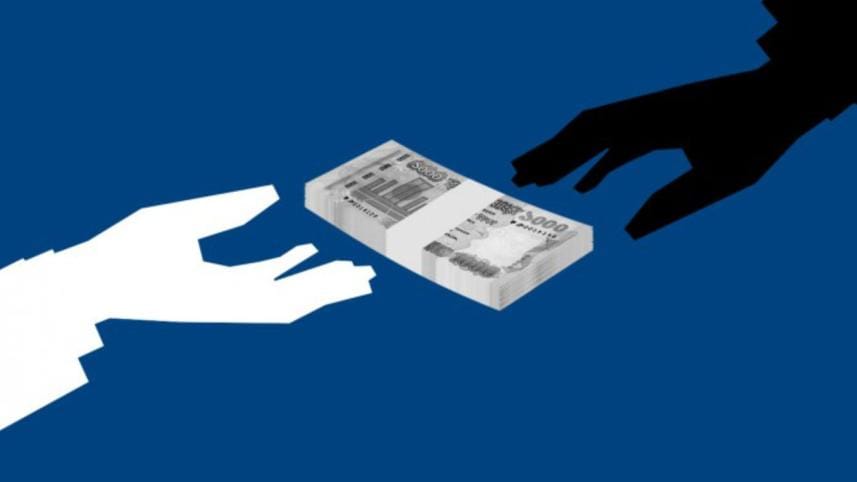How black money can and cannot be reduced

Moving against the current of expert opinion, the government, in the budget for FY2019-20, opened up a five-year scheme to convert black money into white. The plan will allow people with undisclosed income to invest the money in special economic zones and high-tech parks by paying a flat rate of 10 percent tax without having to answer any questions, and permit them to purchase land, flats and apartments by paying tax of Tk 500 to Tk 15,000 per square metre.
It's a controversial decision, primarily in light of the fact that the lowest tax slab in Bangladesh is 10 percent and the highest is 25 percent. Meaning that black-money-holders will be able to whiten their money paying the lowest tax rate, and honest businessmen who pay higher rates of tax will lose out to them for not being corrupt.
While the government is financially incentivising dishonesty in that way, it is arguing that the move is necessary to bring undisclosed income back into the formal economy, to increase its tax net and boost the country's stagnant private sector investment. But if we look at the data, we see that between 1972 and 2017, Tk 18,372 crore was whitened in Bangladesh with the NBR receiving Tk 1,528.74 crore in taxes only. And of the Tk 18,372 crore collected during this entire period, Tk 9,682 crore has been whitened during the tenure of the last caretaker government, while under both AL and BNP governments, the amount of money that has been whitened each year under such schemes is negligible—which leaves no reason to believe that it will be different now under the AL government.
What this plan does, however, is give people who have amassed their wealth in illegitimate ways—through crimes and corruption—the chance to get rid of the financial trail of their wrongdoings and avoid questioning while they are at it, should they need to do so. This essentially leaves them with a "get out of jail free" card to use in times of trouble. Meanwhile, there is another problem—that of the actual black money and the underground economy, which the current government scheme cannot solve.
According to a 2015 IMF report, the size of the black economy in Bangladesh stood at around Tk 4,532.71 billion. And a 2012 finance ministry report prepared on the underground economy estimated that black money amounted to around 45 percent to 85 percent of Bangladesh's GDP. Despite the difference in estimates, what both reports suggest is that huge sums of money are lurking in our underground economy which are not only being generated as a result of crime and corruption, but are also being used to commit more corruption and crime.
This produces an invisible cycle that is difficult to translate into monetary terms, but is devastating nonetheless in terms of the social costs that it imposes. Similarly, because of its nature, finding the real monetary value of the black economy is difficult too, and such estimates often end up undervaluing the true size of the underground economy. And so there is no question that the government does have a big problem on its hands.
Although black money is most often associated with illegitimate activities, in Bangladesh, black money is considered as money earned both legally on which no tax has been paid, as well as money earned illegally and also untaxed. This means that black money can be reduced by strengthening the tax system.
Years ago, the NBR chairman had disclosed that the number of persons paying more than Tk 100,000 as personal income tax in 2011-2012 had not even surpassed one thousand, despite there being 23,212 multi-millionaires in the country. We have seen the latter figure go up year after year. But the former has not increased in accordance with that. This shows one of the most significant weaknesses of our tax system—its failure to bring the rich's share of the wealth under the tax net which, to some extent, is actually a political problem.
According to Dr Muinul Islam, professor, Department of Economics, University of Chittagong, "Black money revolves around the concept of illegally obtained money through political and/or bureaucratic corruption, bribery at all levels of the government," among others. Naturally then, the problem of political and bureaucratic nepotism and favouritism is deeply entrenched in the entire issue of black money. Since it is usually very difficult to separate the two, in order to reduce the share and influence of black money in society, countries must have strong institutions to fight corruption. And that is what we lack most severely. It is this lacking that has given rise to black money growing in Bangladesh in the first place.
This is why the government, instead of trying to cure the symptom of this illness, by launching initiatives to allow the whitening of black money, should look to address the cause, which are the activities that generate black money. This includes strengthening regulatory and monitoring institutions, and granting greater independence to the Anti-Corruption Commission (ACC), whose actions over the years have been anything but bold. However, a great part of why that is, is because of political interference from government high-ups, preventing the ACC and other regulators from pursuing cases against those who are somehow connected to the ruling party of the day or other influential quarters. That, too, must change if the problem of black money is to be addressed effectively.
Eresh Omar Jamal is a member of the editorial team at The Daily Star. His Twitter handle is @EreshOmarJamal




 For all latest news, follow The Daily Star's Google News channel.
For all latest news, follow The Daily Star's Google News channel.
Comments